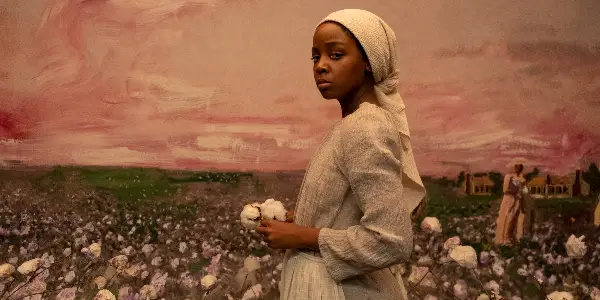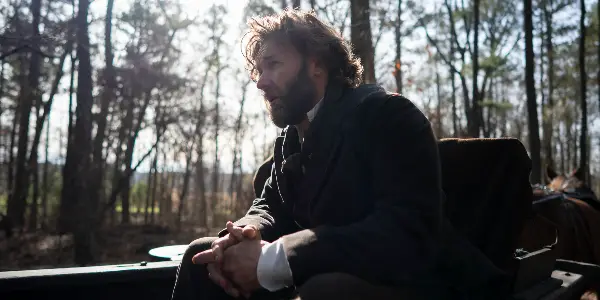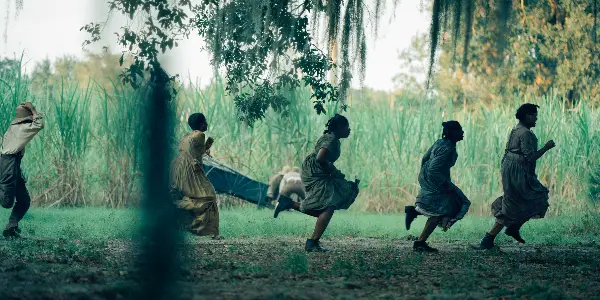THE UNDERGROUND RAILROAD: Barry Jenkins’ Epic & Ambitious Miniseries Is Firing On All Cylinders

Reyzando Nawara is a passionate film and TV enthusiast from…
It may sound strange to describe a TV show telling the story of slavery as hopeful, but that’s just what Barry Jenkins’ 10-hour miniseries The Underground Railroad really is. This, however, should come as no surprise, especially considering that Jenkins‘ previous two features, Moonlight and If Beale Street Could Talk, are also full of hopefulness and perseverance. But The Underground Railroad is so much different than anything Jenkins has ever worked on before; it’s grander and more ambitious, it plays with magical realism to a brilliant result, and most important of all, it further proves Jenkins as one of the greatest storytellers of this generation.
Searching for freedom
The story, adapted from Colson Whitehead‘s Pulitzer-winning novel of the same name, centers on Cora (Thuso Mbedu), an enslaved Black woman on a plantation in Georgia. When she was still 10 years old, her mother Mabel (Sheila Atim) left her to escape the plantation, and ever since that moment, Cora has been harboring anger and so much wound. One day, a newcomer on the plantation, Caesar (Aaron Pierre), asks Cora to escape from the plantation with him using a literal underground railroad built by a network of abolitionists. Though Cora refuses to join him at first, she eventually goes with him to search for freedom in America after witnessing more cruelty inside the plantation.

The first episode of the show largely revolves around Cora and Caesar’s attempt of escaping the plantation, and it’s one of the most intense one-hour of television you’re gonna watch this year. But where most slave-narrative movies and/or television tend to only zoom in on the struggle and the torture that the Black characters have to face to a point where it feels exploitative, in The Underground Railroad, everything feels truthful. Yes, it’s still a tough watch, but Jenkins always manages to put so much humanity in every situation.
The show also never falls into the typical tropes of the Black trauma narrative. In fact, after the first episode, The Underground Railroad shifts the focus almost entirely from the plantation to mostly following Cora’s journey in searching for the meaning of freedom, charting her passage all across America — from South Carolina to North Carolina to Indiana — while being chased by a slave hunter named Arnold Ridgeway (Joel Edgerton) at the same time. This is where The Underground Railroad excels at the most; in observing Cora’s journey, the show also makes its own observation (and opinion) on racial injustice and exploitation in America, which often lies behind white kindness.

It seems as though Jenkins wants to show us that even without the menace of the plantation, Black people are still facing so many hardships, even sometimes in the most mundane and unexpected way possible. A white organization with a motto of helping the Black community, as seen in the second episode of the show, turns out to be using its power for its own gains, and in the process hurts and sacrifices the Black people they wanna “help” in the first place. But even then, the main aspect that the show emphasizes is Black joy. The Underground Railroad, at its core, is proof that Black joy can also co-exist with Black pain.
Excellent on all aspects
Much like in the brilliant Moonlight and the equally excellent If Beale Street Could Talk, Jenkins‘ directorial skill is on full display in The Underground Railroad. The show is lyrical, full of gaze and warmth embrace, but also never shies away from the horror that Cora and her people have to deal with both inside and outside of the plantation. Jenkins graces each frame and every scene with poignancy and grace. He gives his actors room to breathe and to reflect on the events happening around them.
James Laxton‘s cinematography is no less beautiful. His long shots and his beautiful camera angles make the show all the more elegant. The score from the Emmy-wining Nicholas Brittell, who’s worked with Jenkins before in both of his previous films, is atmospheric. It heightens the tightness of the show when the scene requires tension. It adds more tenderness in the scene that needs warmth.

In front of the camera, the talents are as stacked as those behind the camera. As Cora, Mbedu is both fiery and elegant. She knows how to highlight her character’s fearlessness while at the same time bringing so much charisma into her. Pierre’s performance as Cora’s partner exudes bravery and also empathy, while Edgerton gives his Ridgeway a believable level of menace. In the supporting lines, Lily Rabe and William Jackson Harper shine bright, giving memorable turns despite only appearing for just an episode. Jenkins has created a dream collaboration.
Final Thought
Beautifully made and full of grace and empathy, The Underground Railroad shows that there’s another way to tell a story of Black slavery – one that doesn’t need to only rely on pain and trauma, but rather illustrates that Black joy can also be found in a bleak premise too. Jenkins has done it again.
How do you think Cora’s journey will end? Let us know in the comments below!
The Underground Railroad hits Amazon Prime Video on May 14.
Does content like this matter to you?
Become a Member and support film journalism. Unlock access to all of Film Inquiry`s great articles. Join a community of like-minded readers who are passionate about cinema - get access to our private members Network, give back to independent filmmakers, and more.
Reyzando Nawara is a passionate film and TV enthusiast from Indonesia. When he's not watching TV and movies, he likes to cook and make sorbet.












